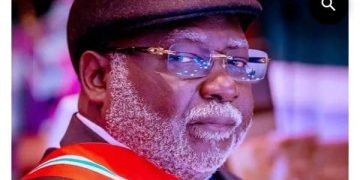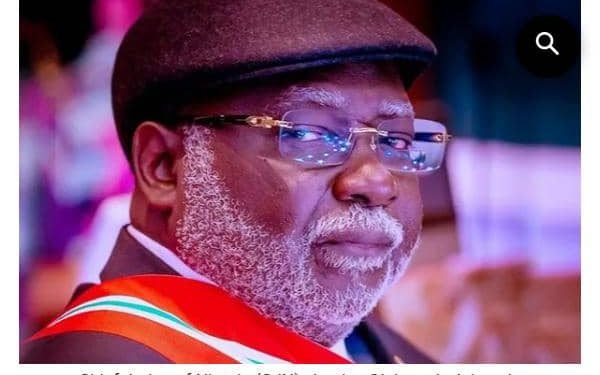By Ononye VC
The Chief Justice of Nigeria, CJN, Justice Olukayode Ariwoola, has generated fresh controversy in the polity as he told newly sworn in judges not to listen to public opinion when considering judgements but what the constitution says.
Mr Ariwoola said this on Wednesday in Abuja while swearing in another batch of the 23 Judges for the Federal High Court.
He charged the judges to always apply constitutional provisions in deciding cases that may be assigned to them.
He said that several vitriolic attacks are regularly heaped on the judiciary; but that it is crystal clear that public opinion, no matter how serious or weighty it might be, cannot override or supersede the Constitution of the country which judges apply in deciding each case.
“Judicial officers owe their conscience and the generality of the Nigerian masses: particularly those who are looking up to them, the great responsibility of good moral rectitude and acceptable conduct to uphold and consolidate the trust reposed in them.
“By virtue of the oath you have just taken, you have, automatically assumed new status and responsibilities in life.
“A new blank page in the book of life has just been opened for you and as it is with public office, especially the judiciary, you are completely opened to daily public scrutiny.
“The pen is right there in your hand to write whatever you desire to be the content of the new page that is now openly displayed in the public domain.
“Like I always say, even though judicial officers are not spirits or superhuman, yet, so much impossible things are expected from them by the society.
He warned that the bench is neither for the indolent, the greedy nor those with dubious character, who can easily fall for a plate of porridge offered by desperate litigants.
“I heartily rejoice with you on this very important and sensitive appointment; but at the same time, I sincerely sympathise with you for the landmines that are already laying on your paths in the course of your adjudication, especially if your conscience is at variance with your conduct.
“You must, at all times, rise above temptations and trials that might obstruct or even halt your rise to the pinnacle of your career.
“We are all humans, no doubt, but you display the humanism in you by doing those extraordinary things that people would ordinarily conclude that you cannot do.
“That is what separates those with integrity and passion for success from those with low pedigree and dysfunctional moral compass”, he added.
He said appointments to the bench was not an appointment to wealth, vainglory, dishonest disposition or ostentatious lifestyle through corrupt acquaintances.
“Whatever wrongdoing that emanates from any form of indiscretion and abuse of office, will, in like manner, be used to conscientize, chastise and thoroughly sanitize the same conscience that you may have refused to listen to.
“The searchlight of the National Judicial Council beams brightly on all judicial officers across the country. The NJC should never, either by omission or commission, be mistaken for a toothless Bulldog.
“It can bark fiercely and as well bite deeply and aggressively, too.
“Our radar is sophisticated enough to detect every form of corruption and wrongdoing by Judicial officers; and we will not waste a moment in taking the necessary action to fish out the bad eggs”.
He said that the remoteness of their locations of adjudication can never blur NJC’s sight on them.
“We have put in place the right machinery to capture and document your conduct.
“So, be careful and take heed, or else, you may end up regretting ever being appointed a judicial officer, although, we don’t wish you such, anyway.
“The entire letters and words of the oath you have just taken, must reside in a prime place of your heart and be generously applied in your adjudications.
“This is a bond that you should engrave in your heart and be well guided by it while adjudicating in all matters that come before you”.
He admonished them to be impartial, fair to all, and apply justice in all your undertakings.
However,a public affairs analyst and Abuja based journalist Mr Chuka Akunna disagreed with the remarks of the CJN.
According to Mr Akunna,sentiments and opinions of citizens matter so much because in decision making because the country belongs to the citizens and are entitled to contributing in shaping and developing the country.
- Latest
- Trending








































